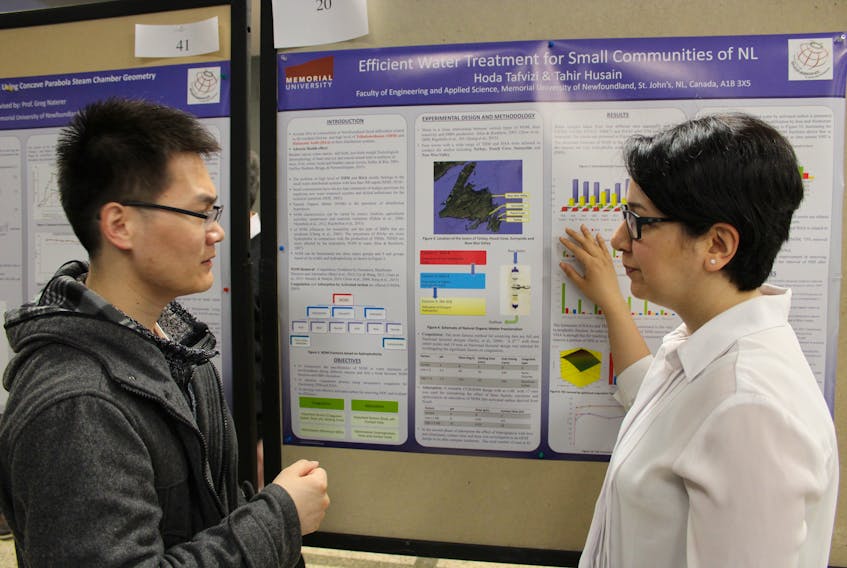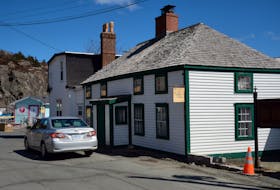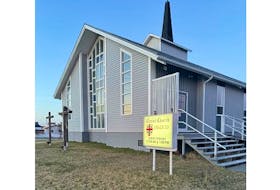Without engineering, our lives would be vastly different.
From the bed you sleep in to the clothes you wear to the mode of transportation you took to work or school today, none of that would be available without engineering.
To achieve those feats of engineering, people must study, research and experiment with any and all processes, and it all starts with the educational component.
That education and research was put on display Wednesday as Memorial University’s faculty of engineering and applied sciences held its 3rd annual Research Day in the lobby of the engineering building on the St. John’s campus.
“Engineering is not easily explained. Everything we see and touch in the world has been engineered at some level for you on a daily basis,” associate dean of graduate studies Leonard Lye said.
“All you use, all you do, you are surrounded by it.”
There were 50 research projects on display for students and the public to view, presented by the students and faculty advisers who helped them in their work.
“There are 50 posters on display here today. Posters are now a standard way to present project findings at conferences,” associate dean of research Claude Daley said.
“The format is for the presenters to stand by their posters and those that attend go grazing for ideas. They find the people with a topic they are interested in and have one-on-one conversations. The presenters are enthusiastic about their work and want to tell someone about it.”
Included in the presentations were projects to enhance oil and gas production, how to use disposable waste and how a community can achieve clean drinking water for its residents.
Hoda Tafvizi, from Iran, is a PhD student in civil engineering at Memorial, and presented her research Wednesday that outlined two processes for cleaning water — coagulation and adsorption.
She went to four communities in eastern Newfoundland and Labrador that experienced difficulty supplying clean water to residents and applied both methods to see which would best achieve the goal of clean water. Those communities included New Wes Valley, Sunnyside, Pouch Cove and Torbay.
“Ultimately, my research centres on finding cheap methods that are efficient and low in cost to provide clean drinking water to communities in Newfoundland,” Tafvizi said.
She said more than a third of communities in the province face difficulties resulting from residual chlorine in the water table and high levels of trialomethames (THM) and haloacetic acids (HAA) in the distribution systems of those communities.
Fixing that issue is not always price effective, so her research centred on finding a low-cost means of cleaning the water for use by residents by removing the natural organic matter, and testing both methods at the locations.
“Coagulation is not costly. I experimented with designs that would give us the best results and through this process we were able to remove about 90 per cent of the THMs through this method,” she said.
“This cleaned the water to standards higher than the levels Health Canada seeks.”
Lye said it is important for people to have an awareness of what is being done at Memorial and what the engineering research is all about and the processes they go through to place people in the best positions possible.
He said it also allows the public to come and see what is done at the university, the useful things for all aspects of society, like water treatment, fixing oil spills, etc.
“We want people to say, ‘Wow man, I came to the right place,” Lye said. “Creation comes from being excited about what you are doing.”
More about MUN engineering
Memorial is the only engineering school in Canada to offer a major in ocean and naval architectural engineering at the undergraduate level and was the first engineering school in Canada to offer a major in process engineering, in addition to being one of the first engineering programs in Canada to deliver a co-operative approach to learning.
Memorial has a long history of engineering studies, beginning in 1930, and obtained full accreditation with the Canadian Engineering Accreditation Board (CEAB) in 1975.
The faculty consists of more than 1,100 undergraduate students, six accredited undergraduate programs, 17 graduate programs, 580 graduate students and more than $16 million per year in annual research funding.









